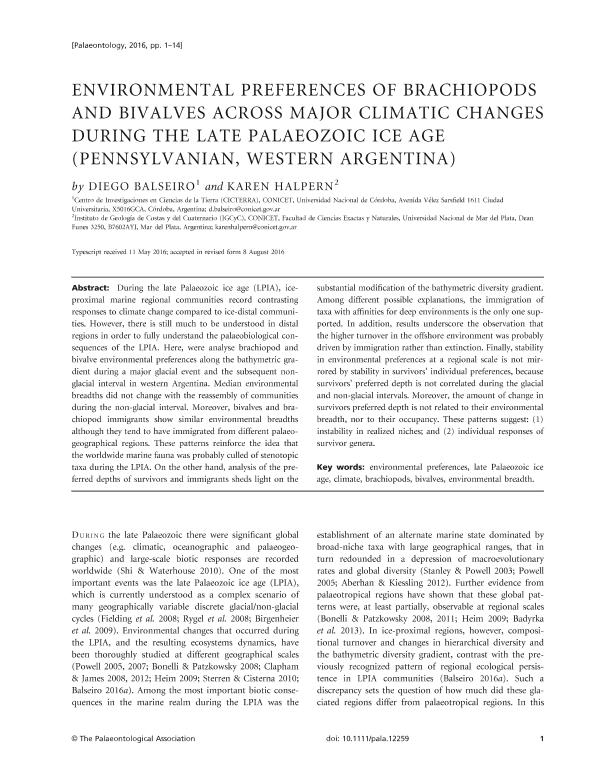Mostrar el registro sencillo del ítem
dc.contributor.author
Balseiro, Diego

dc.contributor.author
Halpern, Karen

dc.date.available
2019-07-25T18:42:34Z
dc.date.issued
2016-09-16
dc.identifier.citation
Balseiro, Diego; Halpern, Karen; Environmental preferences of brachiopods and bivalves across major climatic changes during the Late Palaeozoic ice age (Pennsylvanian, western Argentina); Wiley Blackwell Publishing, Inc; Palaeontology; 59; 6; 16-9-2016; 803-816
dc.identifier.issn
0031-0239
dc.identifier.uri
http://hdl.handle.net/11336/80297
dc.description.abstract
During the late Palaeozoic ice age (LPIA), ice-proximal marine regional communities record contrasting responses to climate change compared to ice-distal communities. However, there is still much to be understood in distal regions in order to fully understand the palaeobiological consequences of the LPIA. Here, were analyse brachiopod and bivalve environmental preferences along the bathymetric gradient during a major glacial event and the subsequent non-glacial interval in western Argentina. Median environmental breadths did not change with the reassembly of communities during the non-glacial interval. Moreover, bivalves and brachiopod immigrants show similar environmental breadths although they tend to have immigrated from different palaeogeographical regions. These patterns reinforce the idea that the worldwide marine fauna was probably culled of stenotopic taxa during the LPIA. On the other hand, analysis of the preferred depths of survivors and immigrants sheds light on the substantial modification of the bathymetric diversity gradient. Among different possible explanations, the immigration of taxa with affinities for deep environments is the only one supported. In addition, results underscore the observation that the higher turnover in the offshore environment was probably driven by immigration rather than extinction. Finally, stability in environmental preferences at a regional scale is not mirrored by stability in survivors’ individual preferences, because survivors’ preferred depth is not correlated during the glacial and non-glacial intervals. Moreover, the amount of change in survivors preferred depth is not related to their environmental breadth, nor to their occupancy. These patterns suggest: (1) instability in realized niches; and (2) individual responses of survivor genera.
dc.format
application/pdf
dc.language.iso
eng
dc.publisher
Wiley Blackwell Publishing, Inc

dc.rights
info:eu-repo/semantics/openAccess
dc.rights.uri
https://creativecommons.org/licenses/by-nc-sa/2.5/ar/
dc.subject
Bivalves
dc.subject
Brachiopods
dc.subject
Climate
dc.subject
Environmental Breadth
dc.subject
Environmental Preferences
dc.subject
Late Palaeozoic Ice Age
dc.subject.classification
Paleontología

dc.subject.classification
Ciencias de la Tierra y relacionadas con el Medio Ambiente

dc.subject.classification
CIENCIAS NATURALES Y EXACTAS

dc.title
Environmental preferences of brachiopods and bivalves across major climatic changes during the Late Palaeozoic ice age (Pennsylvanian, western Argentina)
dc.type
info:eu-repo/semantics/article
dc.type
info:ar-repo/semantics/artículo
dc.type
info:eu-repo/semantics/publishedVersion
dc.date.updated
2019-07-17T17:41:29Z
dc.journal.volume
59
dc.journal.number
6
dc.journal.pagination
803-816
dc.journal.pais
Reino Unido

dc.journal.ciudad
Londres
dc.description.fil
Fil: Balseiro, Diego. Consejo Nacional de Investigaciones Científicas y Técnicas. Centro Científico Tecnológico Conicet - Córdoba. Centro de Investigaciones en Ciencias de la Tierra. Universidad Nacional de Córdoba. Facultad de Ciencias Exactas Físicas y Naturales. Centro de Investigaciones en Ciencias de la Tierra; Argentina
dc.description.fil
Fil: Halpern, Karen. Universidad Nacional de Mar del Plata. Facultad de Ciencias Exactas y Naturales. Instituto de Geología de Costas y del Cuaternario. Provincia de Buenos Aires. Gobernación. Comisión de Investigaciones Científicas. Instituto de Geología de Costas y del Cuaternario; Argentina. Consejo Nacional de Investigaciones Científicas y Técnicas. Centro Científico Tecnológico Conicet - Mar del Plata; Argentina
dc.journal.title
Palaeontology

dc.relation.alternativeid
info:eu-repo/semantics/altIdentifier/doi/http://dx.doi.org/10.1111/pala.12259
dc.relation.alternativeid
info:eu-repo/semantics/altIdentifier/url/https://onlinelibrary.wiley.com/doi/full/10.1111/pala.12259
Archivos asociados
